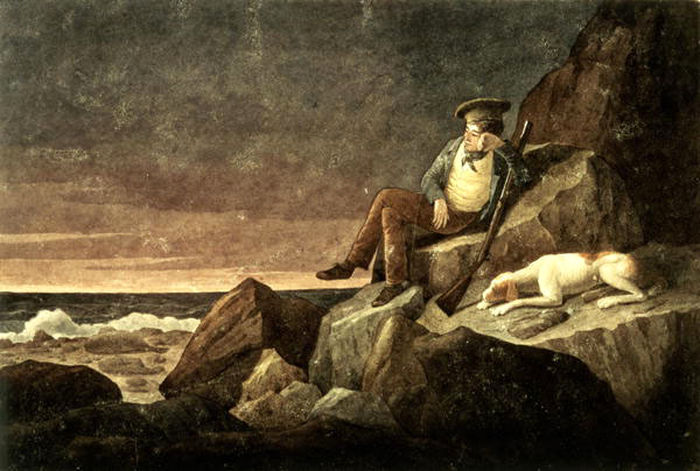The Neapolitan Quartet: Escapism through balance and separation
The world of Elena Ferrante’s Neapolitan Quartet “remains at arm’s length, even when one is in its midst,” making the series a vital source of grounding escapism, writes Martha French.
In The Story of a Lost Child, the final instalment of Elena Ferrante’s Neapolitan Quartet, the narrator speaks of the power of literature to “safeguard a secret meaning that took meaning away from everything else”. This quote, amongst countless others, proves the redundancy of trying to say anything new and interesting about Ferrante’s work; her writing understands and addresses itself more adeptly and beautifully than anything else I have ever read.
Over the past few weeks, in the midst of the coronavirus crisis and performative productivity, reading for pleasure - something I have struggled with since starting my degree - has been my solace. In particular, Elena Ferrante’s four Neapolitan novels (My Brilliant Friend, The Story of a New Name, Those Who Leave and Those Who Stay and The Story of a Lost Child), translated from Italian by Ann Goldstein, have been almost supernaturally stabilising.
Here, escapism is not about avoiding or denying, but about finding balance and separation.
It is a series I have been meaning to read for several years, and yet somehow it has taken a global pandemic for me to find the time to do so. Set in and around Naples, Ferrante’s novels follow the friendship of two girls, Lenu - who narrates the story - and Lila, from its foundations in early childhood to its disintegration in old age. Spanning over fifty years, Ferrante charts the moments at which the lives of the two women converge and diverge, punctuated by marriage, education (or lack thereof), and motherhood. The result is a completely mesmeric, two-in-one coming of age story, all-consuming from start to finish. Here, escapism is not about avoiding or denying, but about finding balance and separation. After all, this is not a world that feels particularly safe - Lenu and Lila’s home is rife with violence, misogyny, terror - but it is intensely different from the one we have known for the past few weeks.
The series offers us two almost-complete life cycles, yet these lives are far from circular. In fact, they confirm - both together and in their own right - that life cannot be made shapely, that to be, and specifically to be female, is to exist in flux. It is for this reason that we see experiences of womanhood that simultaneously feel universal and call the entire concept of universality into question. There is an intimate specificity to the novels’ darkness that is uniquely peculiar. We know Lenu’s suffering, her sexuality, her success, but we are never quite allowed to become it - the narrator sets her world apart from our own. We are more than observers, certainly, but this is a story world that belongs to Ferrante and her characters; it is one that we are privileged enough to visit, but cannot live within.
Perhaps it is this marginality - just as much as Ferrante’s hypnotic style - that allows us to ache for every episode in Lenu and Lila’s life. It is the best kind of escapism because - even when we are in its midst - it remains at arm’s length from us. It is not our reality, and yet it impresses itself upon it like a waking dream. There is something anchoring about this kind of intensity, needed now more than ever. This is ultimately a story of entrapment and isolation, and of how freedom and connection can be forged within this. Essentially, Ferrante has crafted a prolonged treatment of claustrophobia, and yet it offers its readers the most wonderful escape.
The world of Ferrante offers a promise of what has once been and will again be - albeit in some warped, stumbling form.
For it is intoxicatingly sensory writing: her Italy demands to be seen, smelt, heard, felt, tasted, rather than simply read. Of course, this extends far beyond setting - as Lenu recalls episodes from her past with aching nostalgia, we rise and fall with her. This is a deliberate physicality of text; as Ferrante philosophises in her collection of letters and essays Frantumaglia: “the word is always flesh”. Ferrante’s writing bleeds, sweats, bruises, scars over. Her stories seep into us, a result of her careful faith in and application of language, of literature, as a means not simply of communication or immortalisation but of knowing and of living. The word 'vivid' falls short. There is an inexplicable excellence that permeates every element of her writing; no scene, sentence or word feels laboured or interchangeable or awkward.
One of Ferrante’s most striking images, which stitches the four novels together, is that of “dissolving boundaries”, a sensation felt by Lila in her most anxious moments, in which the world seems to liquidise before her. This sense of fluency and blurring speaks of Ferrante’s writing and the experience of reading it in itself; the text seems to overflow, its margins lost, as we are guided with ardour through this brave new world, always in motion.
There is of course a rich - perhaps even sickly - irony in the setting for my escapism: a balmy, bustling Naples. But it is hard to forge any further connection than location; there is little trace of our current reality in Ferrante’s words and world, for how could there possibly be? Maybe it is an insight into this space, prelapsarian and yet unknown, unstable, self-exposing in completely different ways, that is so comforting. It is - as I am finding is all literature, all art - a moment of distance, a promise of what has once been and will again be (albeit in some warped, stumbling form). This idea of reading as travelling - whether it be geographically, emotionally, spiritually - is of course beyond tired, but things only become cliché because they are repeatedly accepted as true. The banality of literature as an escape seems to be one of the only things that can be said about it with any justified certainty. And, to make a long story short, Ferrante’s work has provided me with an escape far better than anything else.
Famously private (‘Elena Ferrante’ is a pseudonym), she remarks in Frantumaglia, “I believe that books, once they are written, have no need of their authors. If they have something to say, they will sooner or later find readers; if not, they won’t.” It is clear these are books that do and have.
 News / Cambridge academics sign open letter criticising research funding changes22 February 2026
News / Cambridge academics sign open letter criticising research funding changes22 February 2026 News / Student and union protesters hold ‘Trans Liberation Solidarity Rally’ 24 February 2026
News / Student and union protesters hold ‘Trans Liberation Solidarity Rally’ 24 February 2026 News / Union speakers condemn ‘hateful’ Katie Hopkins speech14 February 2026
News / Union speakers condemn ‘hateful’ Katie Hopkins speech14 February 2026 Features / Beyond the porters’ lodge: is life better outside college?24 February 2026
Features / Beyond the porters’ lodge: is life better outside college?24 February 2026 Theatre / Footlights Spring Revue? Don’t Mind if I Do!25 February 2026
Theatre / Footlights Spring Revue? Don’t Mind if I Do!25 February 2026









